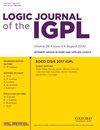基于模型的归纳认知:思想实验给我们的启示
IF 0.8
4区 数学
Q2 LOGIC
引用次数: 0
摘要
在这篇文章中,我们想证明思想实验(TEs)是如何结合认知结构--作为概念隐喻的归纳推理--可靠地支撑着日常思维,并在科学和哲学语境中得到加强和变得更加有效的。事实上,我们可以成功地将思想实验的核心推论结构重新视为一种生成性归纳程序的应用。我们将把TES描述为具有两个特征,这两个特征对于归纳思维和隐喻思维的定义至关重要,但当我们把它们与TE的描述联系起来考虑时,就会发现这两个特征会让人产生轻微的困惑:既能增强知识,又能保护无知。总之,我们可以说,TE 实现了扩展的概念隐喻,这些隐喻是归纳推理形式的实例化,因此,部分地保留了产生这些隐喻的作者的无知(即使他们也通过减轻无知而增加了一些知识)。不过,在某些幸运和特殊的情况下,思想实验也可以提供纯粹的知识增长益处;为此,我们还提到了伽利略发现中思想实验的创新和创造性功能。本文章由计算机程序翻译,如有差异,请以英文原文为准。
Model-based abductive cognition: What thought experiments teach us
In this article, we want to demonstrate how thoughts experiments (TEs) incorporate cognitive structures—abductive inferences as conceptual metaphors—that reliably underpin everyday thinking and are enhanced and rendered more effective in scientific and philosophical contexts. Indeed one might successfully rethink the inferential structure at the heart of thought experiment production as the application of a generative abductive procedure. We shall characterize TES as possessing two characteristics that are essential to the definitions of abductive and metaphorical thinking, but when considered in relation to TE’s description, can excuse mild bewilderment: both knowledge-enhancing and ignorance-preserving features. In sum, we will say that TEs realize extended conceptual metaphors, which instantiate forms of abductive reasoning and, therefore, partially preserve the ignorance of the authors who produce them (even if they also increase a bit their knowledge by—so to speak—mitigating ignorance). In certain fortunate and exceptional instances, however, TEs can also provide a purely knowledge-enhancing benefit; in order to do this, a reference to the innovative and creative function of thought experiments in Galileo’s findings is also included.
求助全文
通过发布文献求助,成功后即可免费获取论文全文。
去求助
来源期刊
CiteScore
2.60
自引率
10.00%
发文量
76
审稿时长
6-12 weeks
期刊介绍:
Logic Journal of the IGPL publishes papers in all areas of pure and applied logic, including pure logical systems, proof theory, model theory, recursion theory, type theory, nonclassical logics, nonmonotonic logic, numerical and uncertainty reasoning, logic and AI, foundations of logic programming, logic and computation, logic and language, and logic engineering.
Logic Journal of the IGPL is published under licence from Professor Dov Gabbay as owner of the journal.

 求助内容:
求助内容: 应助结果提醒方式:
应助结果提醒方式:


